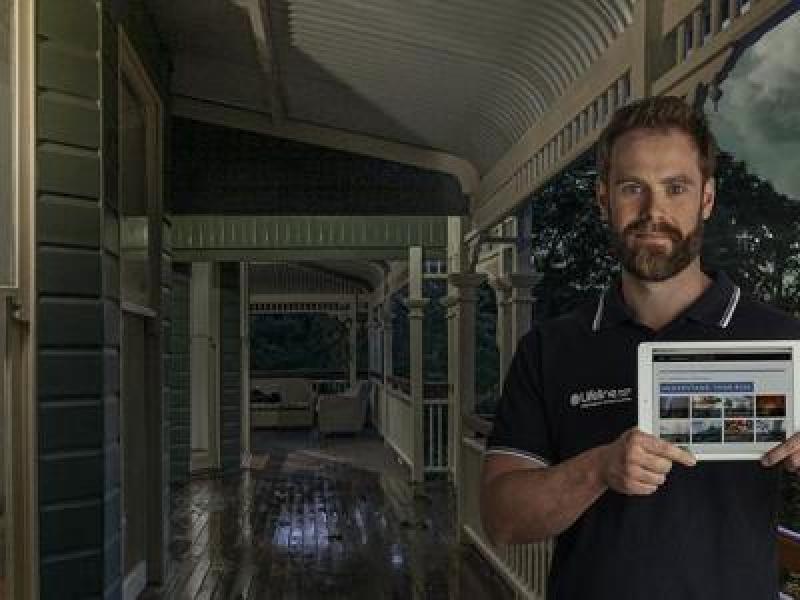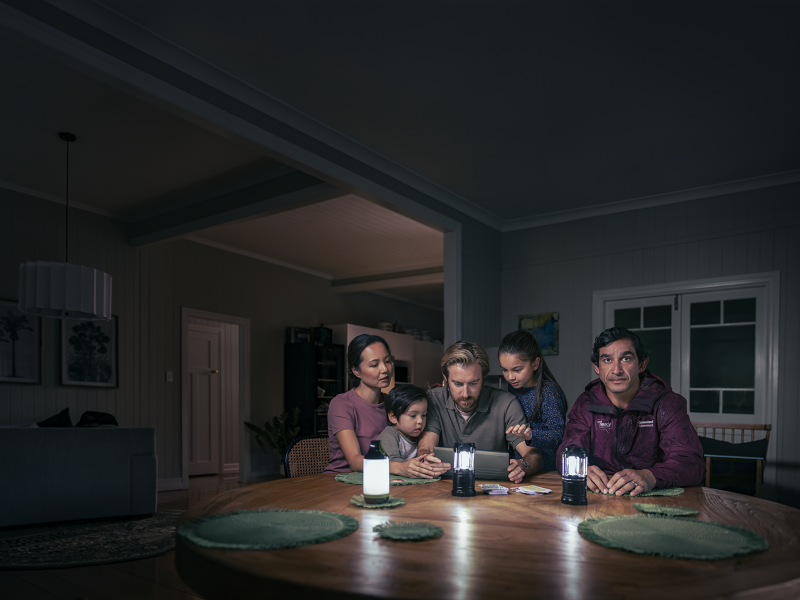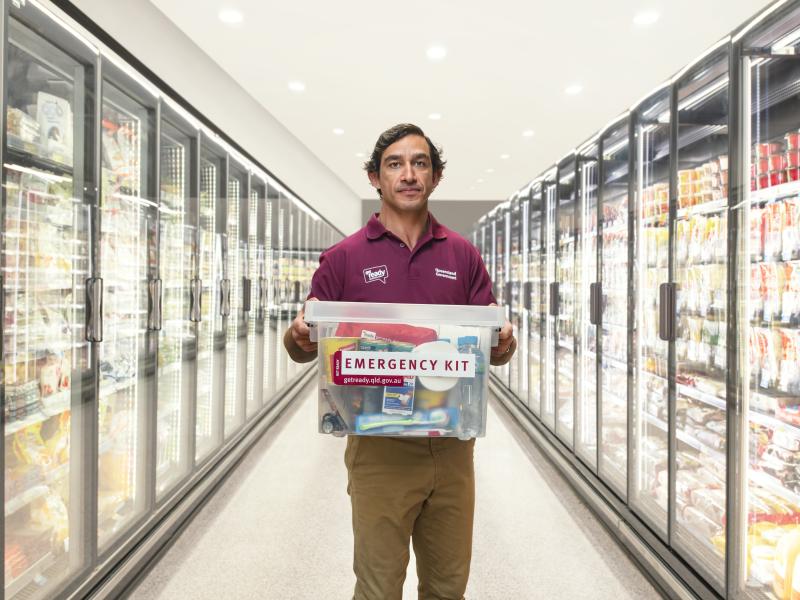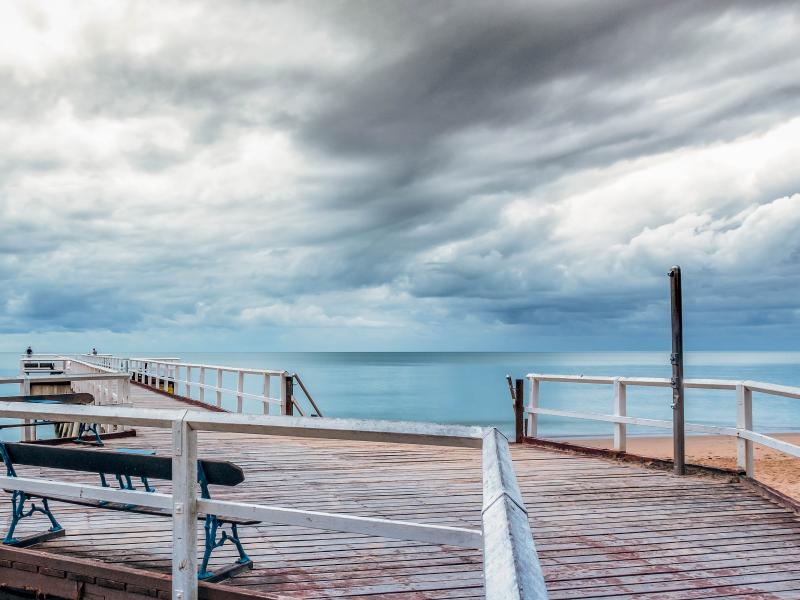When it comes to getting ready for a natural disaster, your top priorities should be preparing your home, looking after your loved ones (including your pets), and protecting what matters most.
Disasters can unfold in many ways, and often, they affect our communities with little warning.
That’s why it’s so important to understand the bigger picture and make a household plan that works no matter where you are when disaster strikes. What if you can’t get home? What if someone needs to leave in a hurry?
Think about your usual routine. The kids might be at school or childcare, you're at work, your partner’s on the road, and the pets are at home. In a disaster being apart can be stressful, but a clear plan gives everyone confidence to act quickly and safely.
Even with alerts from the Bureau of Meteorology and your local council, some events move fast. Cutting off roads, isolating neighbourhoods, and making it hard to access essential services like supermarkets, fuel and medical help.
Understand the big picture and make a plan today so you're ready for whatever comes your way.
The big picture
Hover over the interactive dots below or expand the checklist to explore some common scenarios that can occur in a disaster hit community and how to make a plan to protect what’s most important to you.
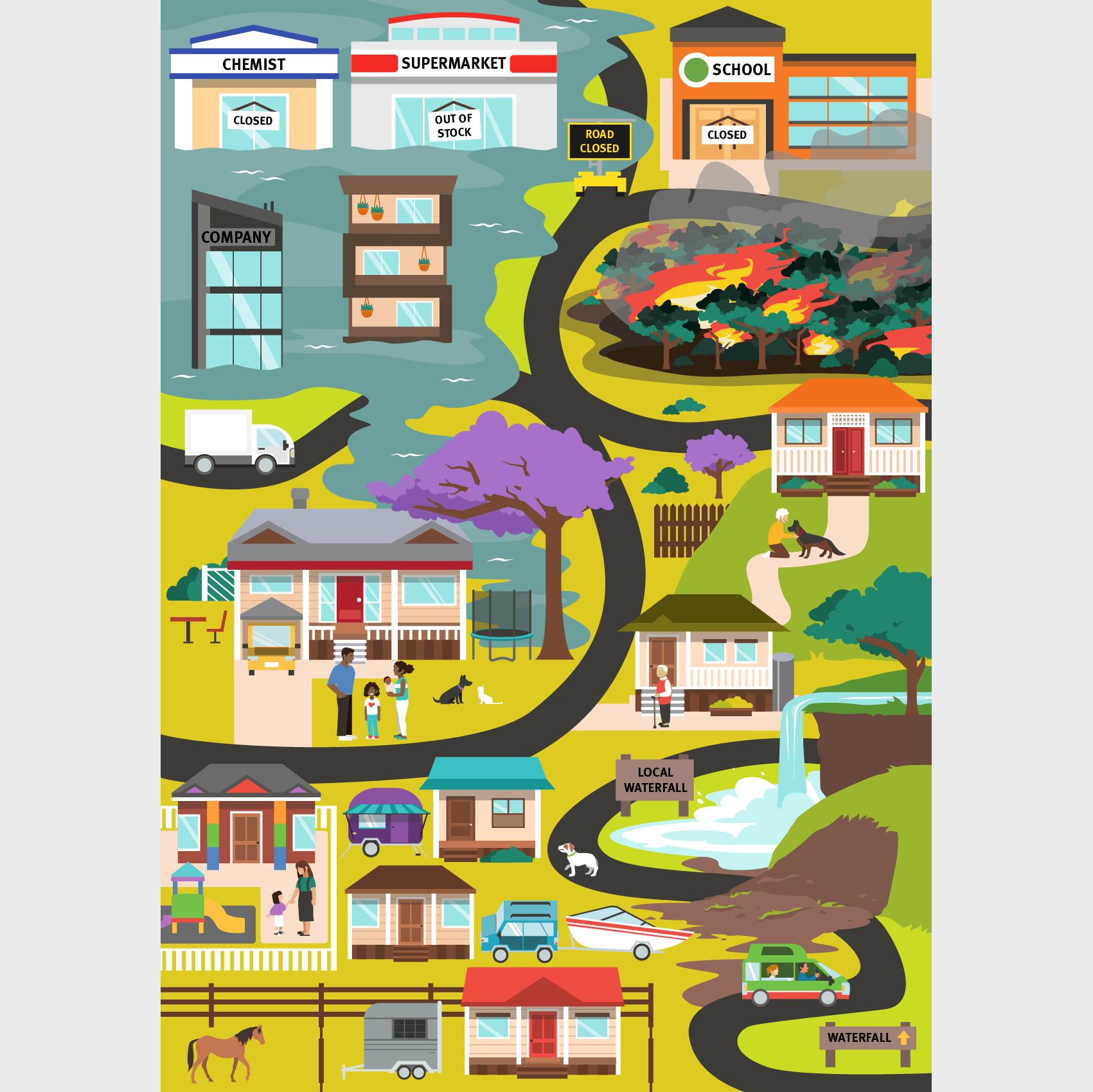
Get Ready for severe weather - focus on how you can best ‘Get Ready’ your home, your loved ones and your pets.
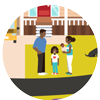
When a disaster is imminent, make sure you check on your neighbours, especially if they have mobility issues, are elderly or vulnerable. When preparing your household severe weather emergency plan, don’t just think about yourself, include your neighbours in your plans.
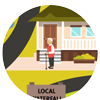
With the kids at school during the day, there is a chance you could become separated if the school becomes isolated due to flooding or bushfire. The school may not even be in the disaster affected area but with road closures and/or public transport disruptions they may not be able to get home. In the event of a severe weather warning being issued, your school will have set procedures in place to notify parents/carers. In the case that you are unable to reach your child, make arrangements for an alternative family member or friend to collect your child and include their details in your Household Severe Weather Emergency Plan.

Protecting your business is more than securing your premises. In the event of a natural disaster hitting your community, you need to have plans in place that will help protect your business, your assets and your staff and will help your business continue to operate and recover quickly.

Floodwaters can block roads which can in turn can affect deliveries of much needed medical supplies reaching your local chemist. Have a pre-packed emergency kit including a first aid kit and a supply of prescribed medicines (if required for any family members) in the event you are unable to get access to your local chemist or if they run out of supplies.
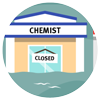
When warnings for a major weather event are issued, supermarkets can quickly become sold out of staples such as bottled water, canned food, matches and bread as people prepare for a period of isolation. Roads can also become inaccessible to delivery trucks to bring in stock to replenish shelves. Having a pre-packed emergency kit with essential items and a pantry with non-perishable staples will keep all the members of your household fully fed and healthy.

If you keep livestock, a Livestock Severe Weather Emergency Plan will safeguard the welfare of your animals and assist with recovery after the event. Have arrangements in place for transporting animals to a safe location in the event of an emergency. This extends to livestock. If you intend to evacuate your property and cannot take your animals with you, ensure they are in a safe place. Move livestock to higher ground if there is a risk that lower areas may become flooded. This may also mean opening gates and giving animals access to other paddocks or areas to escape rising waters or out of control bushfires.

With the youngest member/s of the family in daycare during the day, there is a chance you could become separated if the daycare centre becomes isolated due to flooding or bushfire. In the event of a severe weather warning being issued, the daycare centre should notify all parents. In the case that you are unable to reach your child, make arrangements for an alternative family member or friend to collect your child and include their details in your Online Household Emergency Plan. Ensure you have the additional family members/friends registered with the centre. Ask your centre for a copy of their emergency plan so you know what arrangements are in place.
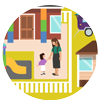
Regardless if you live in a house or an apartment block, your home needs to be in the best shape possible to withstand a natural disaster and protect you and your family from harm during a severe weather event. Apartment blocks that are built in accordance with the building code of Australia for cyclonic conditions are deemed safe. However they can also be severely damaged, most commonly underground carparks housing your personal assets. Therefore, you still need to conduct regular maintenance and prepare your apartment if a severe weather warning is issued. If you are renting and notice something that needs rectifying, talk to your property manager or landlord about getting it fixed. Rectifying it now will save them money in the long run.
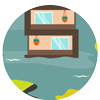
Whether you are from oversees or interstate, you are likely to encounter unfamiliar places and conditions in Queensland that you need to prepare for. Every destination is different, so it's really important to listen carefully to local warnings and local advice.
Heading off soon? Check out our Visitor Safety Tips before you go.
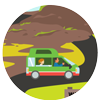
Be aware of the different weather conditions you may experience during your caravan holiday. Check in with the local council for information on the area and common natural disasters that can occur. When a severe weather warning or bushfire alert is issued, take precautionary measures to keep your caravan safe or at least limit its damage.

The key to protecting your boat from cyclones or any threatening severe weather is planning, preparation and timely action. Each boat owner needs a plan unique to the type of boat, the local boating environment and the severe weather conditions. Before the next severe weather season hits, develop a detailed plan of action to protect your boat.

As one of the most vulnerable members of the family, it’s important to consider what will happen to our pets in the event of a natural disaster. This means thinking about what plans you can put in place now to make sure your pet is cared for if you were unable to get home, or what you would do with your pet if you had to evacuate. Make sure you have your pet microchipped and registered with your local council and have them wear a collar with up-to-date contact information and identification at all times to make reuniting with your pet, if you are separated, easier when it is safe to do so.

It is important to nominate a meeting place for the family in case you get separated. Identify a family member or a friend’s house who lives in a neighbouring suburb and include their details in your Household Severe Weather Emergency Plan. Include (and ensure all members of your household know) the address, how to get there from home, school or work and ensure that their name and phone number are saved in their mobiles or written down.

Get Ready for severe weather - focus on how you can best ‘Get Ready’ your home, your loved ones and your pets.

When a disaster is imminent, make sure you check on your neighbours, especially if they have mobility issues, are elderly or vulnerable. When preparing your household severe weather emergency plan, don’t just think about yourself, include your neighbours in your plans.

With the kids at school during the day, there is a chance you could become separated if the school becomes isolated due to flooding or bushfire. The school may not even be in the disaster affected area but with road closures and/or public transport disruptions they may not be able to get home. In the event of a severe weather warning being issued, your school will have set procedures in place to notify parents/carers. In the case that you are unable to reach your child, make arrangements for an alternative family member or friend to collect your child and include their details in your Household Severe Weather Emergency Plan.

Protecting your business is more than securing your premises. In the event of a natural disaster hitting your community, you need to have plans in place that will help protect your business, your assets and your staff and will help your business continue to operate and recover quickly.

Floodwaters can block roads which can in turn can affect deliveries of much needed medical supplies reaching your local chemist. Have a pre-packed emergency kit including a first aid kit and a supply of prescribed medicines (if required for any family members) in the event you are unable to get access to your local chemist or if they run out of supplies.

When warnings for a major weather event are issued, supermarkets can quickly become sold out of staples such as bottled water, canned food, matches and bread as people prepare for a period of isolation. Roads can also become inaccessible to delivery trucks to bring in stock to replenish shelves. Having a pre-packed emergency kit with essential items and a pantry with non-perishable staples will keep all the members of your household fully fed and healthy.

If you keep livestock, a Livestock Severe Weather Emergency Plan will safeguard the welfare of your animals and assist with recovery after the event. Have arrangements in place for transporting animals to a safe location in the event of an emergency. This extends to livestock. If you intend to evacuate your property and cannot take your animals with you, ensure they are in a safe place. Move livestock to higher ground if there is a risk that lower areas may become flooded. This may also mean opening gates and giving animals access to other paddocks or areas to escape rising waters or out of control bushfires.

With the youngest member/s of the family in daycare during the day, there is a chance you could become separated if the daycare centre becomes isolated due to flooding or bushfire. In the event of a severe weather warning being issued, the daycare centre should notify all parents. In the case that you are unable to reach your child, make arrangements for an alternative family member or friend to collect your child and include their details in your Online Household Emergency Plan. Ensure you have the additional family members/friends registered with the centre. Ask your centre for a copy of their emergency plan so you know what arrangements are in place.

Regardless if you live in a house or an apartment block, your home needs to be in the best shape possible to withstand a natural disaster and protect you and your family from harm during a severe weather event. Apartment blocks that are built in accordance with the building code of Australia for cyclonic conditions are deemed safe. However they can also be severely damaged, most commonly underground carparks housing your personal assets. Therefore, you still need to conduct regular maintenance and prepare your apartment if a severe weather warning is issued. If you are renting and notice something that needs rectifying, talk to your property manager or landlord about getting it fixed. Rectifying it now will save them money in the long run.

Whether you are from oversees or interstate, you are likely to encounter unfamiliar places and conditions in Queensland that you need to prepare for. Every destination is different, so it's really important to listen carefully to local warnings and local advice.
Heading off soon? Check out our Visitor Safety Tips before you go.

Be aware of the different weather conditions you may experience during your caravan holiday. Check in with the local council for information on the area and common natural disasters that can occur. When a severe weather warning or bushfire alert is issued, take precautionary measures to keep your caravan safe or at least limit its damage.

The key to protecting your boat from cyclones or any threatening severe weather is planning, preparation and timely action. Each boat owner needs a plan unique to the type of boat, the local boating environment and the severe weather conditions. Before the next severe weather season hits, develop a detailed plan of action to protect your boat.

As one of the most vulnerable members of the family, it’s important to consider what will happen to our pets in the event of a natural disaster. This means thinking about what plans you can put in place now to make sure your pet is cared for if you were unable to get home, or what you would do with your pet if you had to evacuate. Make sure you have your pet microchipped and registered with your local council and have them wear a collar with up-to-date contact information and identification at all times to make reuniting with your pet, if you are separated, easier when it is safe to do so.

It is important to nominate a meeting place for the family in case you get separated. Identify a family member or a friend’s house who lives in a neighbouring suburb and include their details in your Household Severe Weather Emergency Plan. Include (and ensure all members of your household know) the address, how to get there from home, school or work and ensure that their name and phone number are saved in their mobiles or written down.

Get Ready for severe weather - focus on how you can best ‘Get Ready’ your home, your loved ones and your pets.

When a disaster is imminent, make sure you check on your neighbours, especially if they have mobility issues, are elderly or vulnerable. When preparing your household severe weather emergency plan, don’t just think about yourself, include your neighbours in your plans.

With the kids at school during the day, there is a chance you could become separated if the school becomes isolated due to flooding or bushfire. The school may not even be in the disaster affected area but with road closures and/or public transport disruptions they may not be able to get home. In the event of a severe weather warning being issued, your school will have set procedures in place to notify parents/carers. In the case that you are unable to reach your child, make arrangements for an alternative family member or friend to collect your child and include their details in your Household Severe Weather Emergency Plan.

Protecting your business is more than securing your premises. In the event of a natural disaster hitting your community, you need to have plans in place that will help protect your business, your assets and your staff and will help your business continue to operate and recover quickly.

Floodwaters can block roads which can in turn can affect deliveries of much needed medical supplies reaching your local chemist. Have a pre-packed emergency kit including a first aid kit and a supply of prescribed medicines (if required for any family members) in the event you are unable to get access to your local chemist or if they run out of supplies.

When warnings for a major weather event are issued, supermarkets can quickly become sold out of staples such as bottled water, canned food, matches and bread as people prepare for a period of isolation. Roads can also become inaccessible to delivery trucks to bring in stock to replenish shelves. Having a pre-packed emergency kit with essential items and a pantry with non-perishable staples will keep all the members of your household fully fed and healthy.

If you keep livestock, a Livestock Severe Weather Emergency Plan will safeguard the welfare of your animals and assist with recovery after the event. Have arrangements in place for transporting animals to a safe location in the event of an emergency. This extends to livestock. If you intend to evacuate your property and cannot take your animals with you, ensure they are in a safe place. Move livestock to higher ground if there is a risk that lower areas may become flooded. This may also mean opening gates and giving animals access to other paddocks or areas to escape rising waters or out of control bushfires.

With the youngest member/s of the family in daycare during the day, there is a chance you could become separated if the daycare centre becomes isolated due to flooding or bushfire. In the event of a severe weather warning being issued, the daycare centre should notify all parents. In the case that you are unable to reach your child, make arrangements for an alternative family member or friend to collect your child and include their details in your Online Household Emergency Plan. Ensure you have the additional family members/friends registered with the centre. Ask your centre for a copy of their emergency plan so you know what arrangements are in place.

Regardless if you live in a house or an apartment block, your home needs to be in the best shape possible to withstand a natural disaster and protect you and your family from harm during a severe weather event. Apartment blocks that are built in accordance with the building code of Australia for cyclonic conditions are deemed safe. However they can also be severely damaged, most commonly underground carparks housing your personal assets. Therefore, you still need to conduct regular maintenance and prepare your apartment if a severe weather warning is issued. If you are renting and notice something that needs rectifying, talk to your property manager or landlord about getting it fixed. Rectifying it now will save them money in the long run.

Whether you are from oversees or interstate, you are likely to encounter unfamiliar places and conditions in Queensland that you need to prepare for. Every destination is different, so it's really important to listen carefully to local warnings and local advice.
Heading off soon? Check out our Visitor Safety Tips before you go.

Be aware of the different weather conditions you may experience during your caravan holiday. Check in with the local council for information on the area and common natural disasters that can occur. When a severe weather warning or bushfire alert is issued, take precautionary measures to keep your caravan safe or at least limit its damage.

The key to protecting your boat from cyclones or any threatening severe weather is planning, preparation and timely action. Each boat owner needs a plan unique to the type of boat, the local boating environment and the severe weather conditions. Before the next severe weather season hits, develop a detailed plan of action to protect your boat.

As one of the most vulnerable members of the family, it’s important to consider what will happen to our pets in the event of a natural disaster. This means thinking about what plans you can put in place now to make sure your pet is cared for if you were unable to get home, or what you would do with your pet if you had to evacuate. Make sure you have your pet microchipped and registered with your local council and have them wear a collar with up-to-date contact information and identification at all times to make reuniting with your pet, if you are separated, easier when it is safe to do so.

It is important to nominate a meeting place for the family in case you get separated. Identify a family member or a friend’s house who lives in a neighbouring suburb and include their details in your Household Severe Weather Emergency Plan. Include (and ensure all members of your household know) the address, how to get there from home, school or work and ensure that their name and phone number are saved in their mobiles or written down.

Disasters can unfold in ways we don’t always expect and the impacts can ripple through your whole community.
That’s why it’s so important to understand the bigger picture, so you can make the best plan for your household. Because in Queensland, it’s not a matter of if a disaster will happen, but when.
The good news? Getting ready is simple. Follow the 3 steps to Get Ready.
For more tips, check out the links below.
